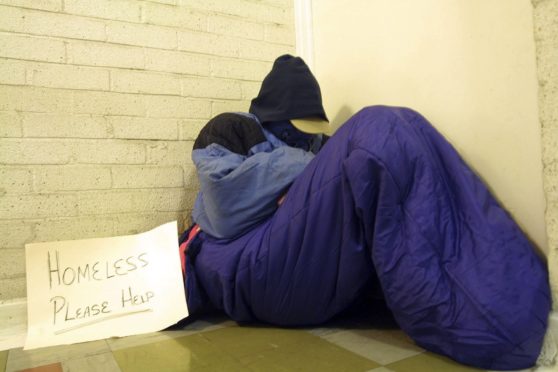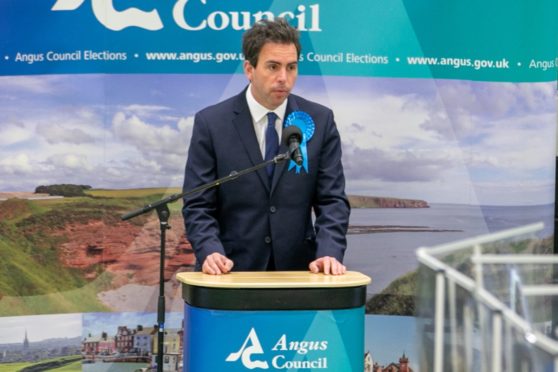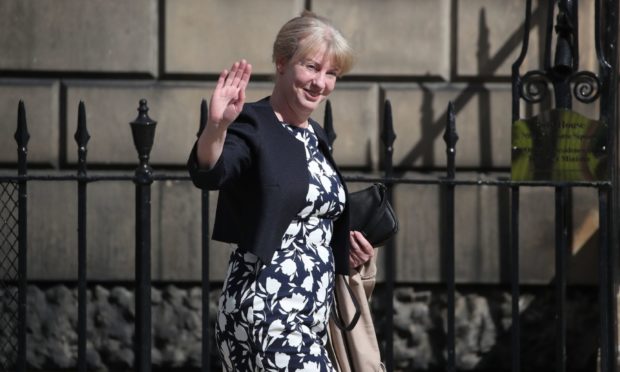Homelessness applications in Dundee rose by almost 10% last year despite an overall reduction being recorded in Scotland.
Homelessness statistics published by the Scottish Government on Tuesday shows Dundee City area as one of only four local authorities to record an increase in homeless applications from 2019-20 and 2020-2021.
While Scotland experienced a 9% drop overall in homeless applications, Dundee City Council area recorded a 9% increase.
There was a 13% increase in those assessed homeless who had slept rough the night before in the same time period.
Dundee also has 4% as a proportion of homeless in Scotland, but only 3% of the total population, providing a homeless rate of 8.9 – above the national average of 6.1
A total 27,571 households were assessed as homeless in 2020-21, a decrease of 13% compared to 2019-20.
The number of households in temporary accommodation reached its highest point for any year since records began in 2002 – an increase of 12% on the year before.
Scottish Conservative North East MSP Maurice Golden called for urgent action from the council and both the Scottish and UK Government’s to stem the trend.
Homelessness charity Crisis Scotland warned “far too many people” in Scotland were still being forced out their homes, despite “extraordinary progress” being made in the wake of the coronavirus pandemic.
Dundee City Council said the coronavirus had impacted its five year plan on tackling homelessness, which had enjoyed a “successful” first 12 months.
Inverclyde, Orkney and Argyll & Bute also noted an increase in applications for homeless assistance. The total number of homeless applications from the three local authority areas equalled 51 more than the year previous.
Post-pandemic response has saved lives
Ashleigh Simpson, head of policy and communications for Scotland at Crisis, said: “Since the start of the pandemic our priority has been to support people off the streets and into safe, self-contained accommodation.
“The urgency of the response from national and local government, as well as homelessness services, has undoubtedly saved lives.
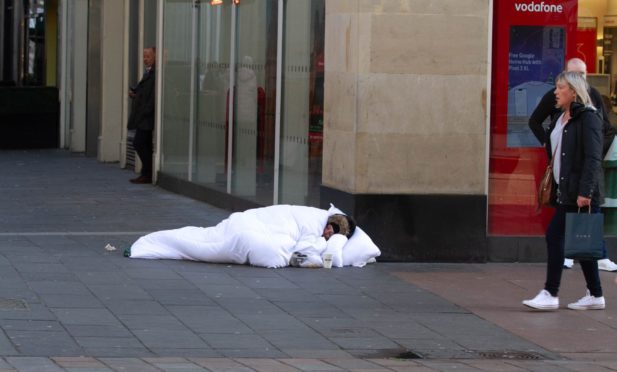
“But while we’ve seen extraordinary progress in ending rough sleeping in Scotland over the last year or so, the response was only ever a short-term solution, which has led to record numbers of people living in temporary accommodation. We need action to ensure these people are supported quickly into safe and settled homes.
“Scotland has some of the best protections for people experiencing homelessness in the world, but far too many people are being forced to leave their homes.
“It doesn’t have to be this way. The best way to end homelessness is to stop people from losing their accommodation in the first place – that’s why we want the Scottish Government and MSPs from every party to come together to change the law around homelessness prevention, so that people get the support they need, when they need it.”
Mr Golden said: “There’s obviously an issue with homelessness in Dundee that is more severe than the rest of the country.
“Coupled with the dire drug addiction issues in the city, it’s clear urgent and serious action is required.
“The Scottish Government has long spoken about the importance of building more homes but action on the ground doesn’t match that.
“In the wake of the Covid pandemic we are facing an economic crisis which, if allowed to run out of control, will only drive more people into poverty.
“The council and both of Scotland’s governments need to all work together to come up with a solution that ensures everyone who needs a home in Dundee is able to access one.
“Investment in that will lead to long-term improvements in employment, public health and overall wellbeing.”
Council provided additional funding
A Dundee City Council spokesperson said: “Dundee City Council has been working hard with partners to combat the challenges of homelessness which have been exacerbated by the pandemic.
“We are now into the second year of five delivering the Rapid Rehousing Transition Plan on homelessness, after a successful first 12 months.
“During that time there has been a significant culture change, creativity and partnership working to deliver improved service delivery and outcomes.
“The Covid-19 outbreak and lockdown occurred just before the end of the first year of the plan and has had a significant impact on the terms of homelessness. This has included an increase in people requiring temporary accommodation. In order to meet this significant demand, the council increased its network of furnished flats.
“The homelessness quota in the Common Housing Register Allocation Policy was increased from 45% to 55% in order to provide more offers of accommodation for homeless applicants.
“Additional funding was made available to support people who were homeless or rough sleeping over the winter months. By working with partner agencies, such as Eagle Wings, Churches in the West, and Shelter, greater levels of support were administered.
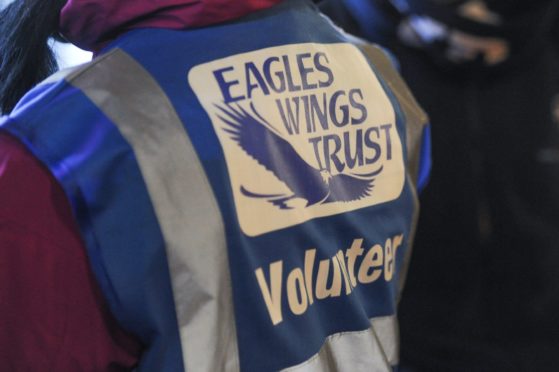
“More people have been prevented from becoming homeless, by the use of RRTP funding for the Rent Deposit Guarantee Scheme to improve access to housing options in the private rented sector.
“The council has a statutory duty to house people who are homeless and we take that extremely seriously. We made a number changes to the way we provide support to tackle the specific problems arising from this health crisis.
“There are a number of reasons why people are homeless and we are committed to working with partners to provide a range of services that can help them with mental health, substance use and financial issues.”
Figures a wake-up call
Scottish Labour’s spokesperson for Housing Mark Griffin said: “These stark figures should act as a wake-up call.
“Every year families are forced to spend more and more time in temporary accommodation, waiting for the safe, secure housing we all deserve.
“This is before we have even felt the full effects of the pandemic. If we do not act now the worst might still be to come.
“The SNP’s refusal to extend the evictions ban to all levels has created a ticking time bomb of homelessness.
“We urgently need a plan to get people into their own homes, without relying on temporary accommodation.”
Rough sleeping at “record low”
Housing Secretary Shona Robison said: “Throughout the pandemic, the Scottish Government’s priority has been to keep people safe from coronavirus.
“We introduced protections to prevent evictions, which have contributed to a 42 per cent reduction in homelessness applications from the private rented sector.
“As recently as last week we announced a £10 million grant fund to support tenants who are struggling as a direct result of the pandemic.
“We also saw a huge effort by partners to work collectively and move hundreds of people from the streets and night shelters into a place of safety. The number of people sleeping rough in the areas where it was concentrated is now at a record low.
“Although this has contributed to an increase in the numbers in temporary accommodation, our utmost objective now is to step up our work with councils to ensure people are supported into permanent settled accommodation. We are investing £37.5 million to support councils to prioritise settled accommodation for all.
“I am glad we are starting to see reductions in number of open homeless cases and in the number of households in temporary accommodation since peaks in September 2020.
“We have pledged an extra £50 million to end homelessness and rough sleeping. Our updated Ending Homelessness Together action plan, published with COSLA in October 2020, renews our commitment and is strongly endorsed by stakeholders.
“We are taking firm action and this month revealed that 102,055 affordable homes have been delivered since April 2007, with 70,866 of these for social rent.
“We also plan to deliver another 100,000 affordable homes by 2032, with at least 70 per cent for social rent, as part of our Housing to 2040 strategy.”
